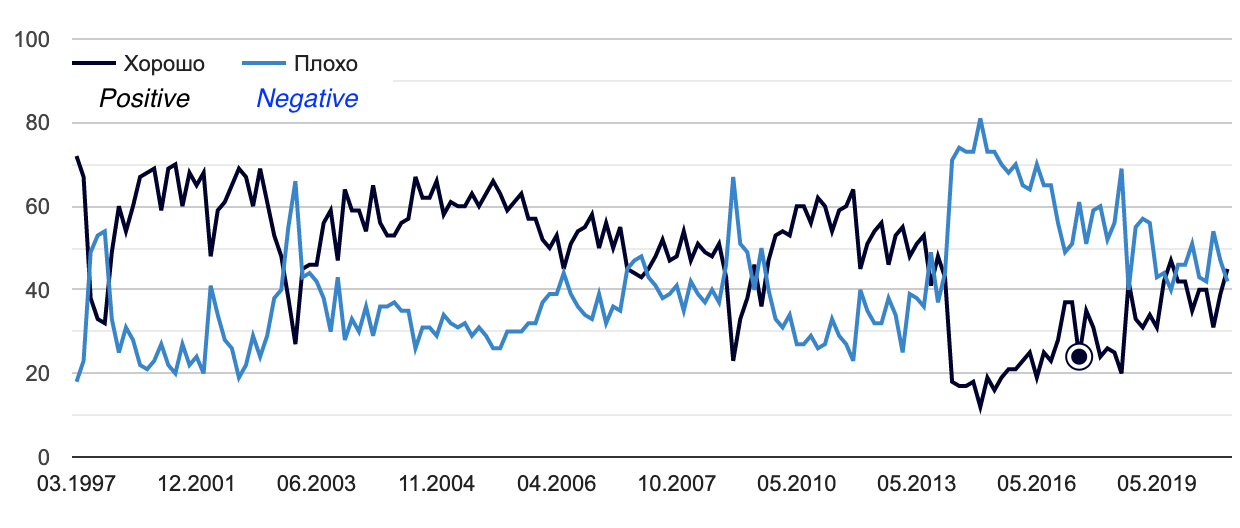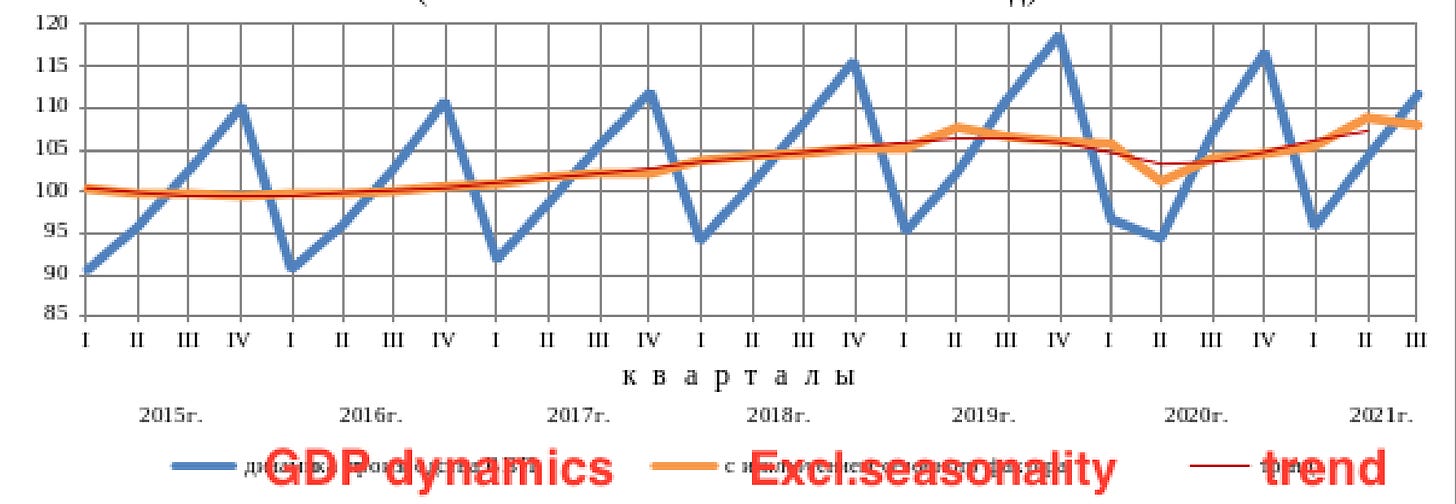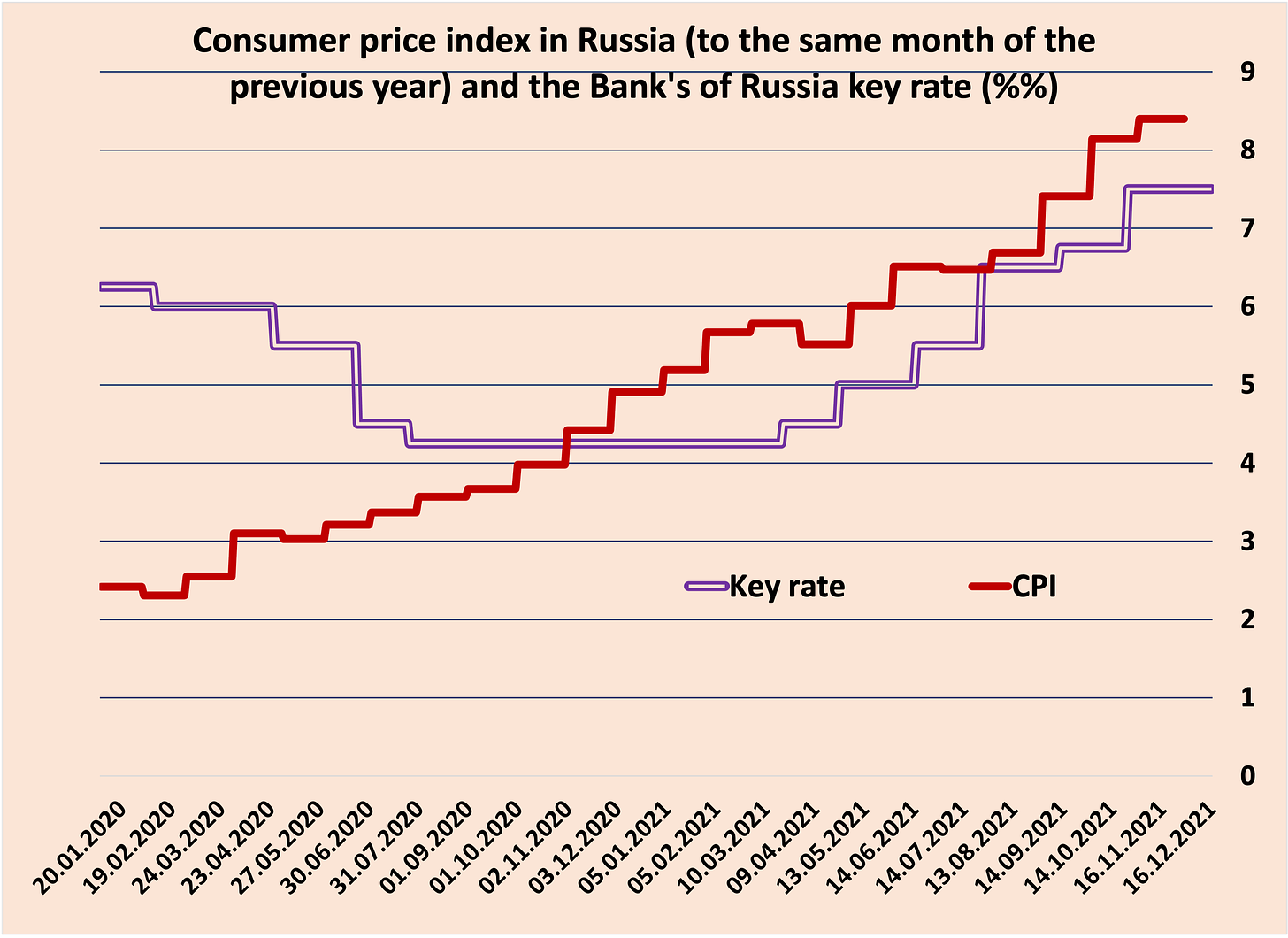Growth has evaporated. Russia doesn’t want. COVID-paradox. Google at the crossroads
December 17, 2021
Detente?
According to a November 2021 poll by the Levada-Center, the percentage of Russians who have a favorable view of the United States outnumbered those who negatively view this country (45% vs. 42%). The predominance of negative attitudes toward America had been observed for eight years since November 2013.
Russian public opinion about other countries is heavily influenced by official propaganda, so the shift noted fits in with the softening of anti-American rhetoric on state TV channels after the meeting between Presidents Putin and Biden in Geneva this summer. Will this shift become sustainable, or will we observe a repeat of what was observed two years ago, when the prevalence of positive attitudes was noted in only one poll? We’ll see.
Growth has evaporated
Rosstat has confirmed its estimate of Russian GDP growth of 4.3% in the third quarter of 2021, compared to the same quarter of 2020. This data should not be misleading—even the official statistics say the recovery growth of the Russian economy has ended, and it has returned to stagnation when one or two quarters of growth will be replaced by a halt or a fall.
GDP growth in Russia (100 = 1/4 GDP-2016) (Rosstat’s chart)
Analysts at the think tank close to First Deputy Prime Minister Andrei Belousov (CMACP) point to a 0.8% drop in third-quarter GDP, compared with the second quarter (allowing for seasonal and calendar effects).
Inflation is forcing a rate hike
The statistics released on the eve of the meeting of the Board of Directors of the Bank of Russia, which will decide to raise the key rate, suggests decisive action by the monetary authorities. According to Rosstat, the GDP deflator for Q3 2021 relative to Q3 2020 was 17.9%, which surprisingly coincided with the population’s estimate of current inflation (17.7%).
According to a survey conducted at the request of the Bank of Russia, inflation expectations of the population continued to grow in December and amounted to 14.8% against 13.5% a month earlier.
All analysts agree on the assumption that the Bank of Russia will continue to raise its rate (currently 7.5%), naming the range of the next step from 50 to 100 p.p.
No administrative control of prices, but we continue
Food markets in Russia are now balanced and there is no need for new renew the agreements to restrain prices, like those that worked this year for sugar and sunflower oil, declared Victor Yevtukhov, the Deputy Minister of Industry and Trade. According to him, the existing system of interaction between the industry players with the government and with each other allows not to renew the agreements on price containment.
“We believe that today the markets are very, very balanced. And we have succeeded: Food inflation is higher than it was in previous years, but it is much lower than it could have been if there had not been this joint work.”
I suspect that this “joint work” is very similar to what we heard yesterday from the Minister of Natural Resources, Alexander Kozlov, who reported to President Putin that he had called for the Prosecutor’s General Office to control the prices.
Russia doesn’t want
Russia does not intend to comply with the European Court of Human Rights (ECHR) ruling, which indicated that Russia needs to change its laws immediately, introducing the concept of “domestic violence” and spelling out measures to prevent it and protect victims from aggressors.
“We believe that the current legislation provides all the necessary tools to combat this evil. Law enforcement agencies make efforts; of course, undesirable, sometimes tragic situations happen—we regret in this regard,” said the President’s press secretary, Dmitry Peskov.
Until the laws are changed, the ECHR will consider claims from Russian victims of domestic violence on an expedited basis. According to the court’s latest ruling, Russia will have to pay one of the complainants 370,000 euros.
Random confession
The website of one of the courts in the Rostov region published a verdict in the case of corruption in food supplies in the Southern Military District in 2019. A witness statement inside says, “This food was intended to be sent to military units of the Russian Armed Forces stationed in the DNR and LNR [self-proclaimed republics in Eastern Ukraine].” There is also a phrase that the bribes were a “personal initiative in connection with the counterparty’s threats to disrupt the delivery of products in the interests of...Russian military personnel on combat duty in the DNR and LNR.”
“Probably we are talking about a mistake of those who wrote this text. Because it is impossible. There are no Russian Armed Forces on the territory of the self-proclaimed republics. There were not, and there are not. There are Russian Armed Forces on the territory of the Russian Federation,” said presidential spokesman Dmitry Peskov.
Of course, there is no mistake in the court’s decision, because these phrases are contained in the interrogation report, in the witness testimony at the trial, and in the indictment approved by the prosecutor’s office and submitted to the court. But Peskov had to say something about it.
COVID news
The daily number of deaths from the coronavirus dropped by 14.7% in two weeks in December, Deputy Prime Minister Tatyana Golikova said, reporting in the State Duma on the government’s successes. But that information doesn’t seem to reflect reality much anymore.
According to Moscow authorities, over the past 24 hours the sickness rate in the capital has risen by 35% after a 24% increase the day before.
The first reaction of the mayors of big cities was the decision to start winter school vacations early. In Moscow, they will begin on December 27 and in St. Petersburg on December 26. Initial plans called for the school holidays to start on December 30.
The government shows lasting fear in the face of the people’s protest caused by introducing QR codes proving the vaccination status. Immediately after the State Duma adopted in the first reading a law on the use of codes in public places, Deputy Prime Minister Golikova proposed an amendment. The use of codes is not required when visiting religious organizations. In addition, it would be sufficient to have the results of the PCR test to visit multifunctional centers to receive public services.
The State Duma decided to re-send this law for discussion in regional parliaments, which is extremely rare. According to Duma Speaker Vyacheslav Volodin, this “will allow us to continue the dialogue with society to avoid rash decisions.”
It seems that the attempt to continue the “dialogue with society” may lead to new surprises. I envisage that many regions that supported this bill a few weeks ago will speak out against it. The regions have been clearly informed that there is no order for unconditional support, and that this is the rare case where they can honestly say what they think.
An interesting paradox emerges: The Russian people have calmly accepted the infringement of many of their political and economic rights and freedoms—free elections disappeared in the country, meetings and rallies were banned, people could be put in jail for their retweet or repost, tens of millions of people’s pension savings were confiscated, the retirement age and VAT rate were raised all at once. None of this sparked a protest movement. But when the authorities decided to protect the population from the pandemic and save the lives of hundreds of thousands of Russians, the country’s citizens created a powerful anti-vaxxer movement that sent the Kremlin into awe.
Google at the crossroads
Russian businessman Konstantin Malofeev has been under U.S. sanctions since late 2014 due to his involvement in financing the armed conflict in Eastern Ukraine. In July 2020, Tsargrad TV, a channel owned by him, reported that its YouTube account had been blocked. A month later, the channel filed a lawsuit to restore its YouTube account and reimburse the money it had lost by monetizing its content due to its deletion.
On December 16, the appeals court in Moscow ruled in favor of the TV channel and set a progressive court penalty, which will be 100,000 rubles per day and will increase progressively weekly and “reach a cap of 1 billion rubles ($13.6 mln) by March 2022. And suppose Google continues to fail to comply with the court order after September 2022. In that case, the progressive penalty will be charged without limiting the maximum amount,” Dmitry Magonya, a lawyer representing the interests of the TV channel, wrote on Facebook.
Google LLC’s annual revenue in Russia for 2020 was 85.46 billion rubles ($1.16 bln). If Google fails to comply with the court order by November 2022, the amount of the court penalty will exceed the company’s income from doing business in Russia.






